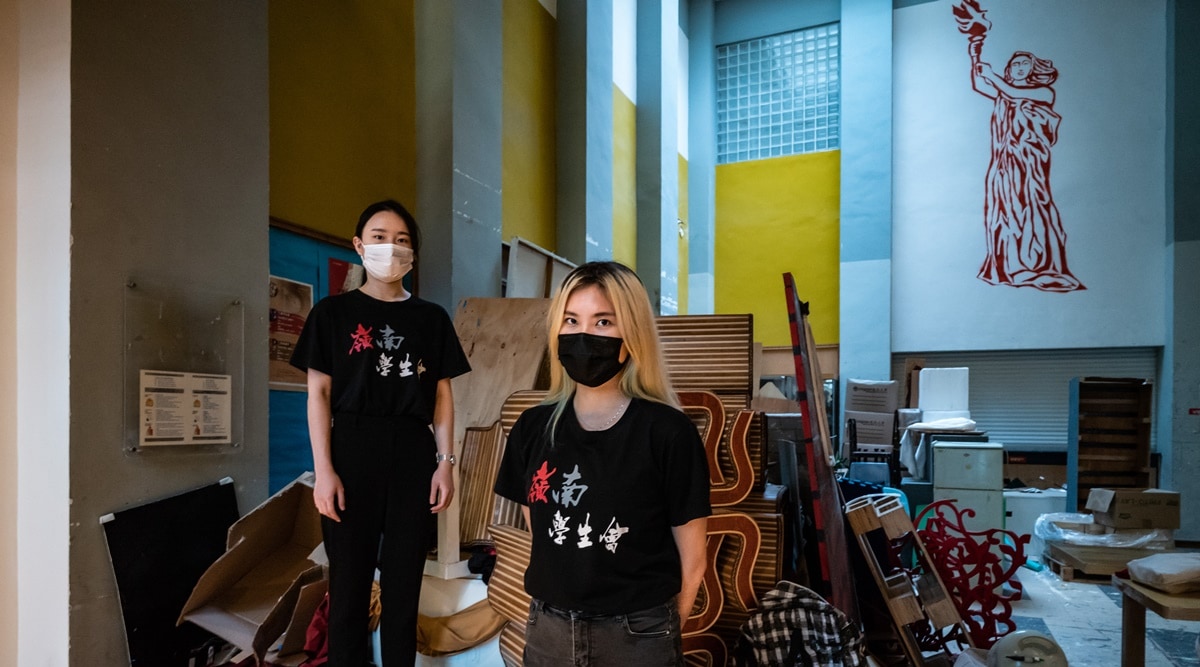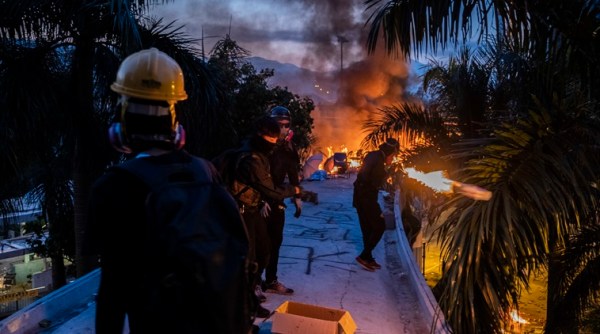 School administrators in Hong Kong have made it harder for student unions to collect dues and organize on campus. Union leaders have been suspended for actions relating to pro-democracy protests. (The New York Times)
School administrators in Hong Kong have made it harder for student unions to collect dues and organize on campus. Union leaders have been suspended for actions relating to pro-democracy protests. (The New York Times) Written by Vivian Wang
The police arrived at the University of Hong Kong around 3 p.m., wearing black vests marking them as national security officers. They cordoned off the offices of the student union, combed its interior and seized several bins of material.
A top police official said they were investigating the union over comments from its leaders that authorities said had glorified violence. But the underlying message of the mid-July raid was clear: Authorities were clamping down on the city’s universities, and in particular its student activists.
Students were among the most determined protesters during Hong Kong’s mass demonstrations in recent years against the Chinese Communist Party’s tightening grip, emerging as a potent political force. Now, authorities are moving to erode their influence, wielding a national security law imposed by Beijing that gives them sweeping powers to muzzle dissent.
School administrators have made it harder for student unions to collect dues and organize on campus. Union leaders have been suspended for actions relating to pro-democracy protests. People’s Daily, the party’s top newspaper, earlier this year compared the University of Hong Kong’s union to a “malignant tumor.”
Student groups — their ranks already diminished by fear and pressure from university administrators — are wondering how much longer they will exist.
“To tell the truth, it feels like we’re just waiting to die,” said Yanny Chan, a union leader at Lingnan University, where the administration has said that it would stop collecting membership fees on the group’s behalf.
 A “Lennon wall”, where people posted slogans and other messages of protest, outside the student union of the University of Hong Kong, Oct. 30, 2020. (New York Times)
A “Lennon wall”, where people posted slogans and other messages of protest, outside the student union of the University of Hong Kong, Oct. 30, 2020. (New York Times)
Outspoken and at times combative, the unions are long-standing pillars of Hong Kong’s civil society. In 2014, student leaders helped kick-start months of pro-democracy protests by storming a downtown square; they later represented the protesters in negotiations with the government. When protests exploded again in 2019, the unions helped organize a general strike and funded legal aid for arrested demonstrators.
The unions have also been training grounds for prominent opposition figures. Lingnan’s union was once led by Nathan Law, who organized students to boycott classes in 2014 in a call for expanded voting rights. Two years later, at 23, he was elected to the city’s legislature as its youngest-ever member. He prefaced his oath of office with a protest against Beijing, saying he would never be loyal to a “regime that murders its own people.” (The government later disqualified and ousted him from the legislature; he now lives in exile in London.)
The unions’ prominence has also stemmed in part from their willingness — like student activists around the world — to stake out divisive positions. The unions have at times been accused of encouraging discrimination against students from mainland China. Some also split with moderate allies over issues such as Hong Kong independence as the idea, anathema to many older activists, gained favor with younger Hong Kongers.
“Student government always acts as a radical flank of the pro-democracy movement,” said Johnson Yeung, who led the Chinese University of Hong Kong’s union in 2012 and 2013. “We don’t always succeed, we don’t always get popularity in our ideas, but we try to create new space. ”
 Protesters clash with riot police at Hong Kong Polytechnic University, November 18, 2019. The New York Times)
Protesters clash with riot police at Hong Kong Polytechnic University, November 18, 2019. The New York Times)
The recent police raid at the University of Hong Kong stemmed from comments from student leaders about a man who stabbed a police officer and then killed himself on July 1. The students had expressed “deep sadness” at the attacker’s death and appreciation for his “sacrifice,” echoing the sympathy that some pro-democracy activists had for a man they saw as a martyr.
Officials responded with rage. Carrie Lam, Hong Kong’s chief executive, said she was “ashamed” and “infuriated” by the students. The government’s Security Bureau called the mourning “no different from supporting and encouraging terrorism” and suggested the union may have violated the security law.
The leaders of the union apologized and resigned. But Lam demanded further action from the university, which within hours said it no longer recognized the group and later ordered it to vacate its offices.
No one was arrested in the police raid on July 16, though the police said the investigation was still open.
As pressure on the unions has increased, students have feared that just joining could make them potential targets. Several universities failed to muster enough candidates to run for the unions’ Cabinets this year.
The unions’ fate has also heightened fears about a broader crackdown on universities. While the student groups were perhaps the most visible sources of dissent on campuses, professors have also worried about their ability to publish on politically sensitive topics. Students have shied away from certain class discussions.
The government has made clear that its scrutiny will not end with the unions. In its statement on the University of Hong Kong, the Security Bureau said that the union’s behavior “clearly reflects the importance” of the government’s “supervision over education institutions.”
Universities are already revising their curriculums. On Monday, three schools announced that they would implement national security education in the coming year, through new seminars or revised core curriculums. Hong Kong’s education secretary said he expected other schools to follow suit soon.
Of the remaining five publicly funded universities, only the City University of Hong Kong responded to inquiries about how it would carry out national security education. In a statement, it said only that it would “continuously uphold the principle of ‘the separation of politics and education.’”
At the University of Hong Kong, a different kind of separation is underway, as officials seek to erase any trace of the now-ostracized union.
As officers rifled through the union’s offices during the raid, billboards around campus that once held union flyers sat empty. On the doors to the offices themselves, a few backings of peeled-off stickers remained.
Within days, school officials had changed the locks. On one glass wall, large stick-on letters that once identified a room as the “Union Photocopy Centre” read only “Photocopy Centre.” The ghost of the word “union” was still visible.
- The Indian Express website has been rated GREEN for its credibility and trustworthiness by Newsguard, a global service that rates news sources for their journalistic standards.

